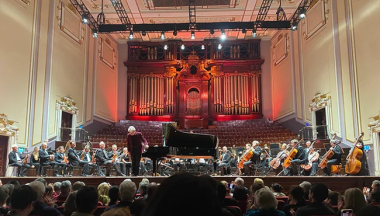 United Kingdom Delius, Smetana, Beethoven, Dvořák: Mark Bebbington (pianist), Czech National Symphony Orchestra / Steven Mercurio (conductor). Usher Hall, Edinburgh, 26.5.2024. (GT)
United Kingdom Delius, Smetana, Beethoven, Dvořák: Mark Bebbington (pianist), Czech National Symphony Orchestra / Steven Mercurio (conductor). Usher Hall, Edinburgh, 26.5.2024. (GT)

Delius – The Walk to the Paradise Garden – Intermezzo from A Village Romeo and Juliet
Beethoven – Piano Concerto No.5 in E-flat major, Op.73 ‘Emperor’
Smetana – Overture to The Bartered Bride
Dvořák – Symphony No.7 in D minor, Op.70
An afternoon concert on a drenched and rainy Edinburgh day marked the sixth visit by this Prague-based ensemble to Edinburgh. The last time I heard from them was under their former Music Director Libor Pešek, sadly he is no longer with us, and his replacement is the American Steven Mercurio who has managed a busy programme of work touring in Europe, the Far East and America. The ensemble was established in 1993 by the trumpeter Jan Hasenöhrl, and their concertising is dominated by light film music and jazz while performing the whole classical repertoire: notably, under Pešek, they recorded the Mahler symphonies. Mercurio is a disciple of Leonard Bernstein, and many of the mannerisms and style of the late composer, pianist and conductor were on show here. The orchestra has a busy time recording on diverse platforms. When I heard them before the pandemic, I was impressed by their musicality in a superb performance of Dvořák’s Seventh Symphony – repeated today.
I cannot remember the last time I heard a piece by Delius in concert, the sole experience is that of the massive A Mass of Life oratorio which opened the Edinburgh International Festival more than a decade ago. Initially, the opening piece was to be Copland’s Appalachian Spring, so this was a refreshing switch. The orchestra revealed colourful harmonies from the clarinet of Lubomir Legemza and the flute of Michal Vajousek. There was a trace of nerves in the strings as the opening theme started on the violins crossing to the double basses, invoking Wagner’s Tristan und Isolde in a theme starting on a tranquil E-flat major, and C major before closing in B major, with a beautiful entry from Mariana Jouzova on the harp, as the idea of Wagner’s Liebestod was heard at the close of this atmospheric piece. It was a fine performance and encouraging to hear a Czech orchestra playing an English piece other than Britten or Elgar.
In the Beethoven ‘Emperor’ Concerto, the strings again showed their strength in expression, asserting the rich Czech strings tradition and enhanced by glorious harmonies from the brass. There was little eye contact between the conductor and the soloist Mark Bebbington and little empathy between the orchestra and the soloist. The cadenza was magnificent in the passage before the horns playing legato led us towards the coda. The slow movement and finale were enriched by revealing some outstanding playing and intensity. The conductor revealed he is a showman at the podium in the Bernstein tradition with his overly sweeping gestures, some of which seemed unnecessary. The encore of Chopin’s Nocturne in C-sharp minor Op.post was worth waiting for: it was gloriously and most sensitively played, revealing the mastery of this outstanding English pianist. In general, I thought the concerto reflected perhaps that the orchestra were playing in their eleventh concert in twelve days.
The second half of the concert was as if a different orchestra were on the stage for in the Smetana overture we heard world-class strings as the violins opened on a bright upbeat idea, as the theme crossed through the violas, cellos and lastly on the double basses, and enhanced by gorgeous playing from the brass and woodwind. This was a merited performance on this composer’s 200th birth anniversary. Bedřich Smetana was the founder of Czech classical music, and among the viola players in the premiere of The Bartered Bride was the young Antonín Dvořák. Indeed, he continued the nationalist Czech school with works in almost every genre.
It was wholly appropriate that Smetana’s exuberant piece was followed by Dvořák’s Seventh (in my opinion, his finest symphony), with glorious playing from every section of the orchestra – it was clear how much this music is in their blood by the vibrant harmony of the string groups. It was evident in the opening Allegro maestoso, by the darkly hued bold idea on the violas and cellos that heralded glorious fortissimo climaxes, driving forward before reprising the opening theme pianissimo across the whole ensemble. The clarinet of Legenza was immaculate in the simple idea that announced the Poco adagio, heralding colourful ideas from Vojacek on the flute and oboe of Radek Mattus. A reflective theme on the violins and cellos was enhanced by the clarinet and by the horn of Ales Janousek invoking a pastoral landscape. The clarinet idea returned magically before fading away.
The more adventurous world of the Scherzo: Vivace-Poco meno mosso, saw some of the most glorious music making in the syncopated rhythms by the orchestra announcing a startlingly atmospheric theme heralding a passage – as if we were entering a woodland adorned by birdsong and tranquillity. Mercurio directed the playing with great zest and led a poignantly volatile passage on the violas that closed stirringly. Numerous striking themes emerged in the exhilarating yet intense Finale: Allegro, through the emergent sequences of quickly evolving brilliant themes shared across the orchestra, the brass were magnificent in their evocation of Bohemian folk harmonies backed by the woodwind group leading to exultant D major chords.
In reward to the cheers from the audience, the orchestra gave an encore of a jazz piece, and we realised how well this orchestra play music of a lighter genre, with splendid solos from the orchestra’s founder Jan Hasenöhrl on the trumpet with accompaniment from Lukas Cheyn on the guitar in a jazz-inflected Bossa Nova piece. It was an enjoyable concert and a diversion from the terrible weather in the capital.
Gregor Tassie
